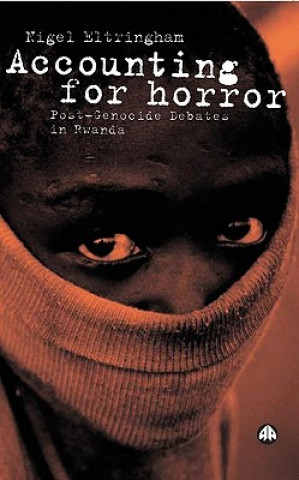
Kód: 04671255
Accounting for Horror
Autor Nigel Eltringham
The 1994 Rwandan genocide was a monumental atrocity in which at least 500,000 Tutsi and tens of thousands of Hutu were murdered in less than four months. Since 1994, members of the Rwandan political class who recognise those event ... celý popis
- Jazyk:
 Angličtina
Angličtina - Vazba: Brožovaná
- Počet stran: 248
Nakladatelství: PLUTO PRESS, 2004
- Více informací o knize

926 Kč
Dostupnost:
50 % šance Máme informaci, že by titul mohl být dostupný. Na základě vaší objednávky se ho pokusíme do 6 týdnů zajistit.
Máme informaci, že by titul mohl být dostupný. Na základě vaší objednávky se ho pokusíme do 6 týdnů zajistit.Prohledáme celý svět
Mohlo by se vám také líbit
-

25 Progressive Studies, Op. 100
278 Kč -

Never Give Up
455 Kč -

Wood Pallet Wonders
407 Kč -

9. Schuljahr
408 Kč -

Die revolutionäre Frage
319 Kč
Dárkový poukaz: Radost zaručena
- Darujte poukaz v libovolné hodnotě a my se postaráme o zbytek.
- Poukaz se vztahuje na celou naši nabídku.
- Elektronický poukaz vytisknete z e-mailu a můžete ihned darovat.
- Platnost poukazu je 12 měsíců od data vystavení.
Informovat o naskladnění knihy
Zadejte do formuláře e-mailovou adresu a jakmile knihu naskladníme, zašleme vám o tom zprávu. Pohlídáme vše za vás.
Více informací o knize Accounting for Horror
Nákupem získáte 93 bodů
 Anotace knihy
Anotace knihy
The 1994 Rwandan genocide was a monumental atrocity in which at least 500,000 Tutsi and tens of thousands of Hutu were murdered in less than four months. Since 1994, members of the Rwandan political class who recognise those events as genocide have struggled to account for it and bring coherence to what is often perceived as irrational, primordial savagery. Most people agree on the factors that contributed to the genocide -- colonialism, ethnicity, the struggle to control the state. However, many still disagree over the way these factors evolved, and the relationship between them. This continuing disagreemnt raises questions about how we come to understand historical events -- understandings that underpin the possibility of sustainable peace. Drawing on extensive research among Rwandese in Rwanda and Europe, and on his work with a conflict resolution NGO in post-genocide Rwanda, Nigel Eltringham argues that conventional modes of historical representation are inadequate in a case like Rwanda. Single, absolutist narratives and representations of genocide actually reinforce the modes of thinking that fuelled the genocide in the first place. Eltringham maintains that if we are to understand the genocide, we must explore the relationship between multiple explanations of what happened and interrogate how -- and why -- different groups within Rwandan society talk about the genocide in different ways.
 Parametry knihy
Parametry knihy
Zařazení knihy Knihy v angličtině Humanities History History: earliest times to present day
926 Kč
- Plný název: Accounting for Horror
- Podnázev: Post-Genocide Debates in Rwanda
- Autor: Nigel Eltringham
- Jazyk:
 Angličtina
Angličtina - Vazba: Brožovaná
- Počet stran: 248
- EAN: 9780745320007
- ISBN: 0745320007
- ID: 04671255
- Nakladatelství: PLUTO PRESS
- Hmotnost: 310 g
- Rozměry: 137 × 216 × 19 mm
- Datum vydání: 20. January 2004
Oblíbené z jiného soudku
-

Learn to Read Ancient Sumerian
789 Kč -

Russian Journal
449 Kč -

King's Two Bodies
679 Kč -

Heart of Europe
517 Kč -

Armies of Castile and Aragon 1370-1516
442 Kč -

One Hell of a Gamble
672 Kč -
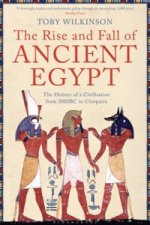
Rise and Fall of Ancient Egypt
464 Kč -

Guns, Germs, and Steel
284 Kč -

The Origins of Totalitarianism
286 Kč -

Illustrated Encyclopedia of Uniforms of World War I
543 Kč -
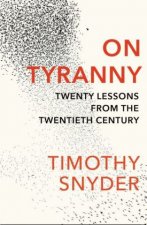
On Tyranny
276 Kč -
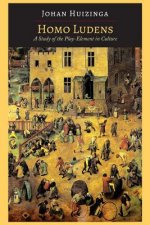
Homo Ludens
305 Kč -

Tuesdays With Morrie
286 Kč -

History of the Decline and Fall of the Roman Empire
357 Kč -

King Leopold's Ghost
303 Kč -

Meditations
214 Kč -

Streams of Gold, Rivers of Blood
770 Kč -

Travels of Ibn Battutah
308 Kč -

Augustus
410 Kč -

Age Of Capital
410 Kč -
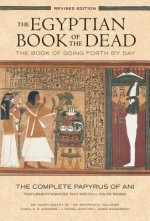
Egyptian Book of the Dead: The Book of Going Forth by Day : The Complete Papyrus of Ani Featuring Integrated Text and Full-Color Images (History ... M
679 Kč -

Deng Xiaoping and the Transformation of China
787 Kč -

Age Of Extremes
462 Kč -

John Skylitzes: A Synopsis of Byzantine History, 811-1057
971 Kč -

Arms and Armour of Late Medieval Europe
276 Kč -

Alexander the Great
382 Kč -

End of Days
195 Kč -

Shake Hands With The Devil
358 Kč -

Complete Roman Army
543 Kč -

Distant Mirror
449 Kč -

Fall of the Roman Empire
614 Kč -

Fifties
484 Kč -

After the Ice
580 Kč -

Histories
146 Kč -

Savage Continent
410 Kč -

Oxford IB Diploma Programme: The Cold War: Superpower Tensions and Rivalries Course Companion
1299 Kč -

Age Of Empire
410 Kč -

Life in a Cave
177 Kč -

Oxford Illustrated History of Prehistoric Europe
983 Kč -

On the Ocean
937 Kč -

Flowers of Battle The Complete Martial Works of Fiore dei Liberi Vol 1
3492 Kč -

On Ancient Warfare
1017 Kč -

Access to History for the IB Diploma: Causes and effects of 20th-century wars Second Edition
909 Kč -

Safe Area Gorazde
517 Kč -

Yoga Body
456 Kč -

Fear and Loathing on the Campaign Trail '72
357 Kč -

Fall of Carthage
515 Kč -

Hidden Figures
306 Kč -
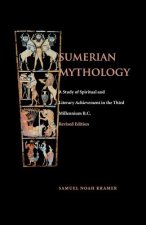
Sumerian Mythology
601 Kč
Osobní odběr Praha, Brno a 12903 dalších
Copyright ©2008-24 nejlevnejsi-knihy.cz Všechna práva vyhrazenaSoukromíCookies


 Vrácení do měsíce
Vrácení do měsíce 571 999 099 (8-15.30h)
571 999 099 (8-15.30h)